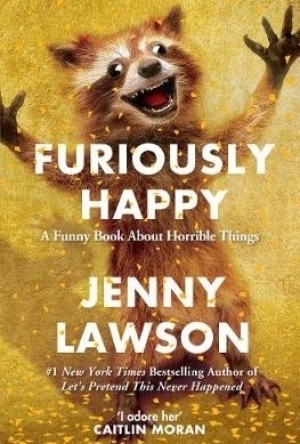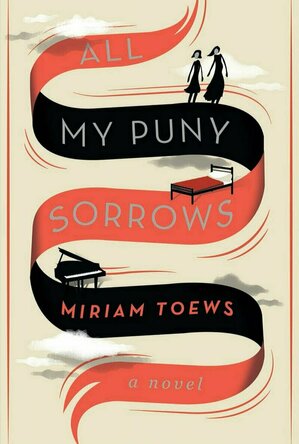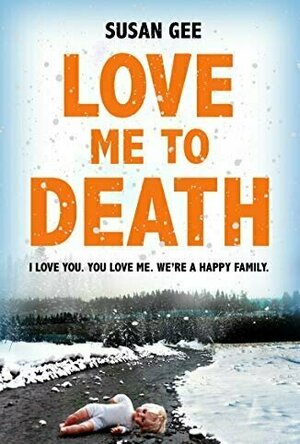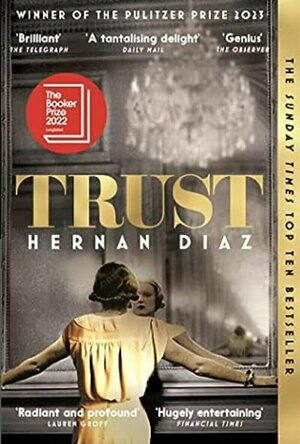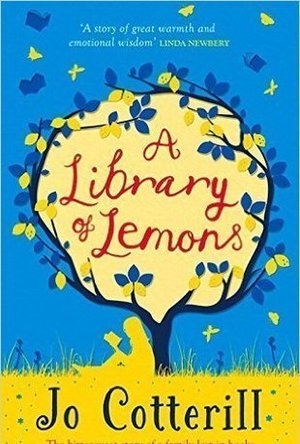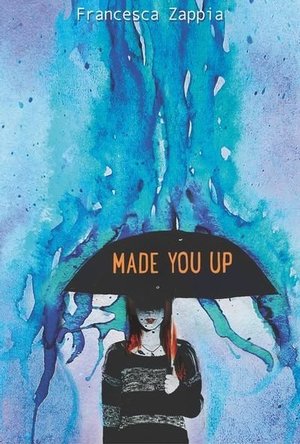Search
Goddess in the Stacks (553 KP) rated Turtles All The Way Down in Books
Feb 8, 2018
Excellent descriptions of mental illness (1 more)
Unique main character
Another excellent book from John Green
So what the cover description of this book doesn't explicitly mention is that Aza, the main character, has a pretty severe anxiety disorder. That's really the core topic of the book - her thought spirals and dealing with life while caught in them. I trust John Green to write about these because he also suffers from severe anxiety. He's talked about it in interviews and on his vlogbrothers Youtube channel. (I'm a big Green brothers fan - what's known as a nerdfighter.) So when John Green writes a character with anxiety, I believe that it's a realistic portrayal. I loved the integration of technology in the story - two characters don't just text each other, the text conversation is on the page, formatted differently, so it's obvious these are text messages. I always love books that do that.
There's not a whole lot I can say about the book without giving things away; a lot of John Green's characters tend to wax eloquently about philosophy and things outside themselves, and Aza doesn't do that because she's so trapped within her own thoughts. She can't think of the future or existential dread because she's too worried about the microbes in her stomach getting out of control and giving her diseases. Definitely a departure from his usual story, though it does fit his standard MO of Main character meets other character who profoundly changes main character's life in some way. (There's a third part that is also consistent with most of John Green's novels but it's a spoiler.)
I think the book is a really good book for anyone who loves someone with anxiety. Or even for those who have anxiety themselves, to see that they're not alone.
You can find all my reviews at http://goddessinthestacks.wordpress.com
There's not a whole lot I can say about the book without giving things away; a lot of John Green's characters tend to wax eloquently about philosophy and things outside themselves, and Aza doesn't do that because she's so trapped within her own thoughts. She can't think of the future or existential dread because she's too worried about the microbes in her stomach getting out of control and giving her diseases. Definitely a departure from his usual story, though it does fit his standard MO of Main character meets other character who profoundly changes main character's life in some way. (There's a third part that is also consistent with most of John Green's novels but it's a spoiler.)
I think the book is a really good book for anyone who loves someone with anxiety. Or even for those who have anxiety themselves, to see that they're not alone.
You can find all my reviews at http://goddessinthestacks.wordpress.com
Goddess in the Stacks (553 KP) rated Furiously Happy in Books
Jan 24, 2018
Made me almost fall off the bed giggling (2 more)
Hilarious descriptions about bizarre situations
Revealing what's going on in her head lets other people know they're not alone
Hysterically funny
How do you even begin to explain a Jenny Lawson book? Known as The Bloggess on the internet, Lawson is one of the most laugh-out-loud, hysterically funny, off-the-wall-crazy-pants writers I've ever come across. From her antics with taxidermied animals to the bizarre arguments she has with her husband to the weird tangents her brain goes on, Lawson is one of the most entertaining people on the internet. In Furiously Happy, she explores her lifelong fight with mental illness, from depression to anxiety to a number of manias, and she does so in a lovely, non-judgmental way. She does get serious - she talks about her "folder of 24" - 24 letters from suicidal people telling her that she, and the community she's built, are the reason they're still here. Lawson tackles the topic of depression head on, and by writing down the bizarre things that go through her head, lets people know THEY'RE NOT ALONE, and that's incredibly important.
As the subtitle of the book says, it might be a book about a serious topic, but oh. my. is it funny. Between sneaking a taxidermied ecstatically happy raccoon into view of her husband's video conferences, and trying to snuggle koalas in Australia while dressed in a full-body koala costume, Lawson also talks about waking up in the middle of the night thinking her arms have fallen off, and being stalked by carnivorous swans. Lawson's blog is hilarious, and this book is one of the most insanely funny things I've ever read, and now I have to track down her other two books. (Let's Pretend This Never Happened and You Are Here)
You can find all my reviews at http://goddessinthestacks.wordpress.com
As the subtitle of the book says, it might be a book about a serious topic, but oh. my. is it funny. Between sneaking a taxidermied ecstatically happy raccoon into view of her husband's video conferences, and trying to snuggle koalas in Australia while dressed in a full-body koala costume, Lawson also talks about waking up in the middle of the night thinking her arms have fallen off, and being stalked by carnivorous swans. Lawson's blog is hilarious, and this book is one of the most insanely funny things I've ever read, and now I have to track down her other two books. (Let's Pretend This Never Happened and You Are Here)
You can find all my reviews at http://goddessinthestacks.wordpress.com
Kristy H (1252 KP) rated All My Puny Sorrows in Books
Feb 13, 2018
This was a tough novel to read. Which isn't to say it's bad. It's not. At all. In fact, it's lovely and lyrical and beautiful. It's just tough. It chronicles the tale of two sisters, Yolandia (Yoli) and her older sister, Elfrieda (Elf). Yoli grows up in the shadow of the talented Elf, who is a famous pianist and an amazing free spirit. Yoli adores her from a young age, as Elf is the only one she knows who has the will and strength to fight against their religious Mennonite upbringing.
As adults, it seems like Elf has it all together - a loving partner, a successful career as a famous pianist, while Yoli is struggling - she's divorced (she's working on number two) and working to stay afloat as an author and raise her two kids.
However, underneath, we learn Elf has a great sadness, as the book covers her suicide attempts, including one as she is about to embark on a concert tour. Yoli rushes to her sister's side, but struggles to help her.
Overall, as I stated, the book is lovely, despite its sad subject matter (my heart hurts that apparently much of this is autobiographical for Toews). Having lost a loved one to suicide, reading a lot of this was very hard, indeed. I was very drawn to Yoli - she is a well-written character and you find yourself rooting for her, as she deals with her sister, her mother, and her crazy life. Even fragile Elf is beautiful. The girls' mother is quite a character; I loved her deeply. She was a trip.
I had to power through this one - sometimes all the bad things happening were overwhelming. The strength of character pulled me through it. I found myself a little frustrated at times ("why am I reading this?!"), but it truly is lovely, and if you've dealt with mental illness in any way (either yourself or with someone you love), while it will hurt, it's also a worthwhile read.
As adults, it seems like Elf has it all together - a loving partner, a successful career as a famous pianist, while Yoli is struggling - she's divorced (she's working on number two) and working to stay afloat as an author and raise her two kids.
However, underneath, we learn Elf has a great sadness, as the book covers her suicide attempts, including one as she is about to embark on a concert tour. Yoli rushes to her sister's side, but struggles to help her.
Overall, as I stated, the book is lovely, despite its sad subject matter (my heart hurts that apparently much of this is autobiographical for Toews). Having lost a loved one to suicide, reading a lot of this was very hard, indeed. I was very drawn to Yoli - she is a well-written character and you find yourself rooting for her, as she deals with her sister, her mother, and her crazy life. Even fragile Elf is beautiful. The girls' mother is quite a character; I loved her deeply. She was a trip.
I had to power through this one - sometimes all the bad things happening were overwhelming. The strength of character pulled me through it. I found myself a little frustrated at times ("why am I reading this?!"), but it truly is lovely, and if you've dealt with mental illness in any way (either yourself or with someone you love), while it will hurt, it's also a worthwhile read.
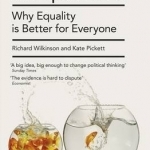
The Spirit Level: Why Equality is Better for Everyone
Richard Wilkinson and Kate Pickett
Book
Richard Wilkinson and Kate Pickett's The Spirit Level: Why Equality is Better for Everyone is the...
SO
Speaking of Sadness: Depression, Disconnection, and the Meanings of Illness
Book
Combining a scholar's care and thoroughness with searing personal insight, David A. Karp brings the...
SC
Stop Caretaking the Borderline or Narcissist: How to End the Drama and Get On with Life
Book
People with Borderline or Narcissistic Personality Disorders have a serious mental illness that...
BookInspector (124 KP) rated Love Me to Death in Books
Sep 24, 2020 (Updated Jan 26, 2021)
There are two main characters in this book, and the book is told from their perspectives. Mr Anderson is a loner, living in a house that everyone is calling a “freak house”, all he wants is his own family, and he is ready to kill for it. Jacob is a teenager, that has lost his mother and is bullied by his stepmother. Jacob has only one friend- Maggie, but after her cousin sister is murdered, he is about to lose her as well. The characters in this book were not my favourite ones, and I found it difficult to connect with them. I liked Mr Anderson’s parts in this novel, I found his thoughts very amusing and very disturbed. The man has a very damaged personality, that is pretty dark and scary. Jacob’s parts in this book were very repetitive and dull, and I found myself skimming the text on many occasions.
The narrative of this book didn’t really have to offer anything. Yes, it discusses important topics, such as bullying, mental illness, loneliness, child abuse etc. But the way it was incorporated just didn’t work for me. The plot kind of plodded along, without any interesting twists or turns, and I didn’t feel any suspense whatsoever. I kept reading in hope of something major to happen, but it never did. 😦
The writing style wasn’t to my liking as well, I feel the book was expanded with the repetitive thoughts about Maggie. The setting of the book felt dark and gloomy, as well as the characters. The chapters have a medium length but Jacob’s parts really dragged to me. The book has some gory details regarding murders, and creepy thoughts of a killer as well. I liked the ending of the book, it did leave me satisfied with the outcome.
So, to conclude, this book was not my cup of tea. I loved the killer, his strangeness and his thoughts, but other than that the characters and the plot felt bleak and boring.
The narrative of this book didn’t really have to offer anything. Yes, it discusses important topics, such as bullying, mental illness, loneliness, child abuse etc. But the way it was incorporated just didn’t work for me. The plot kind of plodded along, without any interesting twists or turns, and I didn’t feel any suspense whatsoever. I kept reading in hope of something major to happen, but it never did. 😦
The writing style wasn’t to my liking as well, I feel the book was expanded with the repetitive thoughts about Maggie. The setting of the book felt dark and gloomy, as well as the characters. The chapters have a medium length but Jacob’s parts really dragged to me. The book has some gory details regarding murders, and creepy thoughts of a killer as well. I liked the ending of the book, it did leave me satisfied with the outcome.
So, to conclude, this book was not my cup of tea. I loved the killer, his strangeness and his thoughts, but other than that the characters and the plot felt bleak and boring.
It took me a bit to get into Trust, but I’m glad I persevered, and that I went back and read the synopsis!
Trust is made up of four narratives about the same man. The first is a book written by Harold Vanner called ‘Bonds’. It tells the story of tycoon Benjamin Rask in the 1920’s and his role in the 1929 crash. It’s also about his wife, Helen, her love of the Arts, how she descends into mental illness and dies in a European asylum.
The second story is comprised of the notes that Andrew Revel, a Wall Street banker and tycoon, makes in order to write his autobiography. His wife Mildred also features, and her death from cancer, also in a treatment centre in Europe.
The third is written by Ida Partenza (my favourite part), where she is looking back on the time that she worked for Revel, ghost-writing his biography. She clearly intensely dislikes her employer, mainly because he lies throughout his storytelling, and is quite upfront about doing it. He’s also aware of her father being a political refugee from Italy, an anarchist, and there’s an underlying menace.
And the final part are the notes and diaries that Ida finds in the ‘present’ day written by Mildred, leading up to her death. They reveal the secrets that her husband would rather not know. Why these are still in a library that can be accessed by the public isn’t known, but the handwriting is pretty indecipherable, so that may well be the reason.
Obviously the first story is about the man in the last three, and we are asked to trust that the man who wrote the first is lying - and therefore trust that Andrew Revel is telling the truth. Clearly he isn’t. His wife’s notes back that up. Revel is a manipulative man, who doesn’t hesitate to ruin other people’s lives in order to protect his reputation.
I read this whole novel with horrified fascination. It’s a good one!
Trust is made up of four narratives about the same man. The first is a book written by Harold Vanner called ‘Bonds’. It tells the story of tycoon Benjamin Rask in the 1920’s and his role in the 1929 crash. It’s also about his wife, Helen, her love of the Arts, how she descends into mental illness and dies in a European asylum.
The second story is comprised of the notes that Andrew Revel, a Wall Street banker and tycoon, makes in order to write his autobiography. His wife Mildred also features, and her death from cancer, also in a treatment centre in Europe.
The third is written by Ida Partenza (my favourite part), where she is looking back on the time that she worked for Revel, ghost-writing his biography. She clearly intensely dislikes her employer, mainly because he lies throughout his storytelling, and is quite upfront about doing it. He’s also aware of her father being a political refugee from Italy, an anarchist, and there’s an underlying menace.
And the final part are the notes and diaries that Ida finds in the ‘present’ day written by Mildred, leading up to her death. They reveal the secrets that her husband would rather not know. Why these are still in a library that can be accessed by the public isn’t known, but the handwriting is pretty indecipherable, so that may well be the reason.
Obviously the first story is about the man in the last three, and we are asked to trust that the man who wrote the first is lying - and therefore trust that Andrew Revel is telling the truth. Clearly he isn’t. His wife’s notes back that up. Revel is a manipulative man, who doesn’t hesitate to ruin other people’s lives in order to protect his reputation.
I read this whole novel with horrified fascination. It’s a good one!
Hazel (1853 KP) rated A Library of Lemons in Books
Dec 17, 2018
<i>This ebook was provided by the publisher via NetGalley in exchange for an honest review
A Library of Lemons</i> is the most recent novel by children’s author Jo Cotterill. It is a moving story about a child’s perception of a life heavily affected by loss and grief, and the impact a positive friendship can bring. Calypso is only ten years old but has the reading age of someone much older. In fact she loves books so much that she prefers them to interacting with other people. Since her mother’s death five years previously, Calypso’s father has distanced himself from the world, focusing on writing and reading in his study, and has encouraged his only daughter to do the same: “be your own best friend.” However, a new girl at school causes Calypso to question and change the way she views the world.
Despite never having had a friend at school, Calypso quickly develops a strong friendship with Mae who also has a passion for reading. The difference is Mae lets herself feel emotion and is happy to let other people into her life, a concept that is initially alien to Calypso. As time goes on Calypso realizes she is the happiest she has ever been and that Mae has filled a gap she did not know was there. Regrettably, her newfound contentment is shattered on discovering that something is wrong with her father, and that he has developed an unhealthy obsession with lemons…
From the very beginning the reader is shown how difficult Calypso’s life is. She often comes home to a cold, dark house where she has to fix herself her own dinner from a very limited supply of food. Yet until Calypso meets Mae, she does not realize that there is anything wrong with this. Once Calypso learns that her father is suffering with depression – something that older readers will already have guessed – she sees how unfair life is for her and notices that she is very different from other children her age. This is a heartbreaking situation for readers to imagine, but Calypso’s strength as a young carer is admirable – similarly to characters in some of her favourite books, such as<i> Anne of Green Gables</i>.
There are so many well-known novels referenced in <i>A Library of Lemons</i>, which emphasizes Calypso’s love of literature. Although Cotterill has included children’s classics amongst these titles, it is doubtful that young readers will be familiar with them all. This poses the problem that certain allusions to characters or storylines will be lost, however if the youngsters are just as passionate about reading as Calypso is, they may be inspired to seek out these famous works.
I was initially drawn to <i>A Library of Lemons</i> because I had loved Cotterill’s previous novel, <i>Looking at the Stars</i>. I was not aware at first that this novel tackled mental illness – which was not a problem as I often read books of that genre – but I was expecting something powerful and moving. And that is what I got. I much preferred <i>Looking at the Stars</i>, which I thought was a lot more emotional and shocking – a refugee camp in a third world country – however <i>A Library of Lemons</i> is still a beautiful story with deep and quotable prose.
Before I finish this review I would like to praise Cotterill for the way she dealt with the taboo subject of mental illness. Often illnesses of this nature are either glamourized or stigmatized, neither of which occurred in this novel. Cotterill’s portrayal of depression and its affects on both sufferer and child are extremely realistic. The way that the book ends is also true-to-life. There is no happy ever after, no amazing cure – but there is hope, a glimpse of recovery and a better future.
Although Calypso is ten, her advanced reading age and the difficult subject matter result in a book that is more suitable for young teenagers. Young and old adults will also enjoy it too, especially those who can relate to certain situations Calypso has to deal with. <i>A Library of Lemons</i> is definitely a story to read if you are a lover of books - a bookworm. You will not be disappointed.
A Library of Lemons</i> is the most recent novel by children’s author Jo Cotterill. It is a moving story about a child’s perception of a life heavily affected by loss and grief, and the impact a positive friendship can bring. Calypso is only ten years old but has the reading age of someone much older. In fact she loves books so much that she prefers them to interacting with other people. Since her mother’s death five years previously, Calypso’s father has distanced himself from the world, focusing on writing and reading in his study, and has encouraged his only daughter to do the same: “be your own best friend.” However, a new girl at school causes Calypso to question and change the way she views the world.
Despite never having had a friend at school, Calypso quickly develops a strong friendship with Mae who also has a passion for reading. The difference is Mae lets herself feel emotion and is happy to let other people into her life, a concept that is initially alien to Calypso. As time goes on Calypso realizes she is the happiest she has ever been and that Mae has filled a gap she did not know was there. Regrettably, her newfound contentment is shattered on discovering that something is wrong with her father, and that he has developed an unhealthy obsession with lemons…
From the very beginning the reader is shown how difficult Calypso’s life is. She often comes home to a cold, dark house where she has to fix herself her own dinner from a very limited supply of food. Yet until Calypso meets Mae, she does not realize that there is anything wrong with this. Once Calypso learns that her father is suffering with depression – something that older readers will already have guessed – she sees how unfair life is for her and notices that she is very different from other children her age. This is a heartbreaking situation for readers to imagine, but Calypso’s strength as a young carer is admirable – similarly to characters in some of her favourite books, such as<i> Anne of Green Gables</i>.
There are so many well-known novels referenced in <i>A Library of Lemons</i>, which emphasizes Calypso’s love of literature. Although Cotterill has included children’s classics amongst these titles, it is doubtful that young readers will be familiar with them all. This poses the problem that certain allusions to characters or storylines will be lost, however if the youngsters are just as passionate about reading as Calypso is, they may be inspired to seek out these famous works.
I was initially drawn to <i>A Library of Lemons</i> because I had loved Cotterill’s previous novel, <i>Looking at the Stars</i>. I was not aware at first that this novel tackled mental illness – which was not a problem as I often read books of that genre – but I was expecting something powerful and moving. And that is what I got. I much preferred <i>Looking at the Stars</i>, which I thought was a lot more emotional and shocking – a refugee camp in a third world country – however <i>A Library of Lemons</i> is still a beautiful story with deep and quotable prose.
Before I finish this review I would like to praise Cotterill for the way she dealt with the taboo subject of mental illness. Often illnesses of this nature are either glamourized or stigmatized, neither of which occurred in this novel. Cotterill’s portrayal of depression and its affects on both sufferer and child are extremely realistic. The way that the book ends is also true-to-life. There is no happy ever after, no amazing cure – but there is hope, a glimpse of recovery and a better future.
Although Calypso is ten, her advanced reading age and the difficult subject matter result in a book that is more suitable for young teenagers. Young and old adults will also enjoy it too, especially those who can relate to certain situations Calypso has to deal with. <i>A Library of Lemons</i> is definitely a story to read if you are a lover of books - a bookworm. You will not be disappointed.
Heather Cranmer (2721 KP) rated Made You Up in Books
Jun 22, 2021
I'm big into books that deal with mental illnesses. When I heard about Made You Up by Francesca Zappia, I knew it was a book that was right up my alley. I was not left feeling disappointed.
The plot and world building felt very realistic although I'm not Schizophrenic nor do I know anyone who is. I could not tell what was real and what was a delusion by Alex. Kudos to Zappia for giving us a brief glimpse into how a Schizophrenic would feel. I kept second guessing myself throughout Made You Up. Sometimes it would be obvious that Alex was hallucinating, but there were many times everything felt too real to be a hallucination. I would be wrong, and something realistic would be a hallucination. As you can imagine, there were many plot twists throughout this book. There was one major plot twist which I had predicted towards the beginning which turned out to be true thanks to subtle hints the author would throw in, so be sure to be attention to every word on the page to try to grasp what is Alex's reality and what is not. I did feel like the main storyline of Made You Up was whether or not Miles, the boy Alex met briefly when she was a young child, was actually real or not since she meets him again her senior year of high school. It was fun trying to guess if Miles was real or not and if he was the same boy Alex met as a child.
All of the characters in Made You Up had a lot of depth to them. They were all easy for me to imagine as real people instead of characters in a book. I enjoyed reading about Alex and her thought process and what all she had to go through all the time due to her Schizophrenia. Alex, like all the characters in this book, was a very likable character. Miles was interesting. I didn't really know what to make of him throughout the book (mainly because I was trying to figure out if he was real or imaginary). I did enjoy him, and I was definitely intrigued by his back story. It was great learning about him. I loved little Charlie and how much she seemed to love her big sister, Alex. Alex loved Charlie so much as well, and I loved reading about the tight sisterly bond between them.
Trigger warnings for Made You Up include some profanity, some violence, death, minor gore, some child abuse, mental illness, a minor sexual situation, bullying, references to Nazis, attempted murder, and death.
All in all, Made You Up is a very interesting read with a fantastic plot and well developed characters. It's obvious the author did her homework before writing this novel. I would definitely recommend Made You Up by Francesca Zappia to those aged 16+ who are seeking a book full of twists and turns. Just be warned that this book will have you second guessing almost everything (which isn't a bad thing).
The plot and world building felt very realistic although I'm not Schizophrenic nor do I know anyone who is. I could not tell what was real and what was a delusion by Alex. Kudos to Zappia for giving us a brief glimpse into how a Schizophrenic would feel. I kept second guessing myself throughout Made You Up. Sometimes it would be obvious that Alex was hallucinating, but there were many times everything felt too real to be a hallucination. I would be wrong, and something realistic would be a hallucination. As you can imagine, there were many plot twists throughout this book. There was one major plot twist which I had predicted towards the beginning which turned out to be true thanks to subtle hints the author would throw in, so be sure to be attention to every word on the page to try to grasp what is Alex's reality and what is not. I did feel like the main storyline of Made You Up was whether or not Miles, the boy Alex met briefly when she was a young child, was actually real or not since she meets him again her senior year of high school. It was fun trying to guess if Miles was real or not and if he was the same boy Alex met as a child.
All of the characters in Made You Up had a lot of depth to them. They were all easy for me to imagine as real people instead of characters in a book. I enjoyed reading about Alex and her thought process and what all she had to go through all the time due to her Schizophrenia. Alex, like all the characters in this book, was a very likable character. Miles was interesting. I didn't really know what to make of him throughout the book (mainly because I was trying to figure out if he was real or imaginary). I did enjoy him, and I was definitely intrigued by his back story. It was great learning about him. I loved little Charlie and how much she seemed to love her big sister, Alex. Alex loved Charlie so much as well, and I loved reading about the tight sisterly bond between them.
Trigger warnings for Made You Up include some profanity, some violence, death, minor gore, some child abuse, mental illness, a minor sexual situation, bullying, references to Nazis, attempted murder, and death.
All in all, Made You Up is a very interesting read with a fantastic plot and well developed characters. It's obvious the author did her homework before writing this novel. I would definitely recommend Made You Up by Francesca Zappia to those aged 16+ who are seeking a book full of twists and turns. Just be warned that this book will have you second guessing almost everything (which isn't a bad thing).

